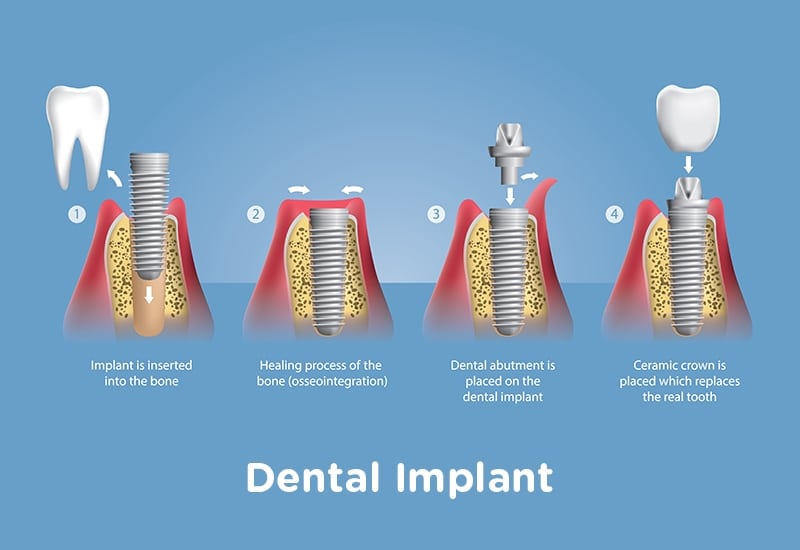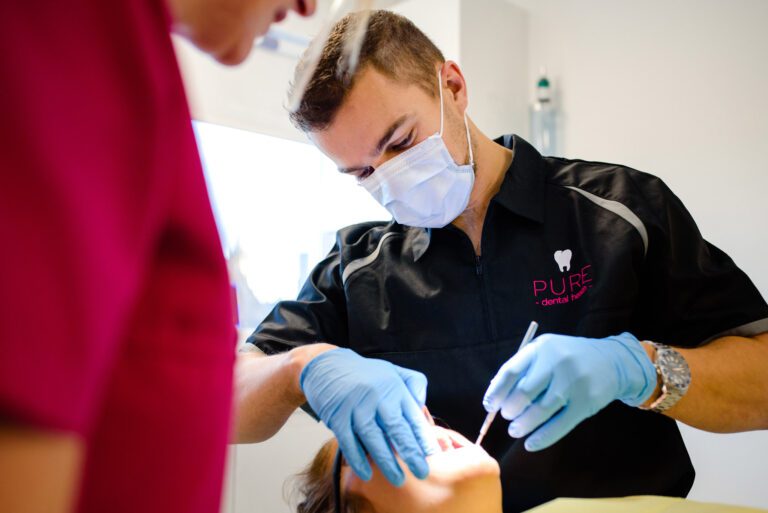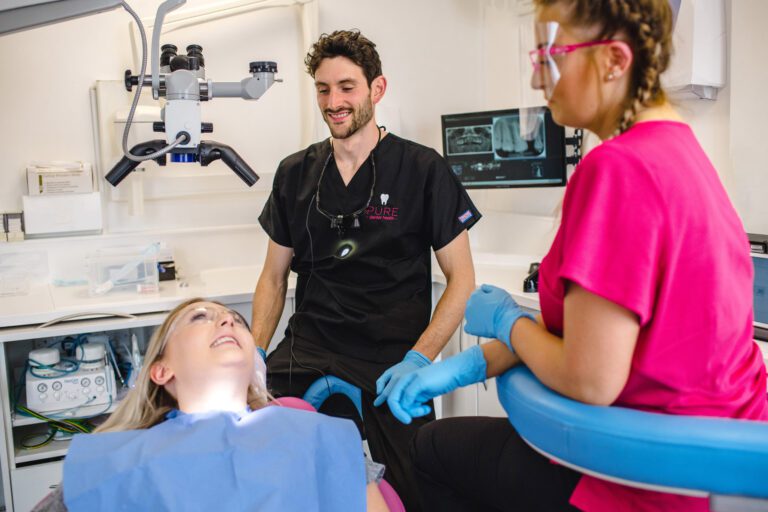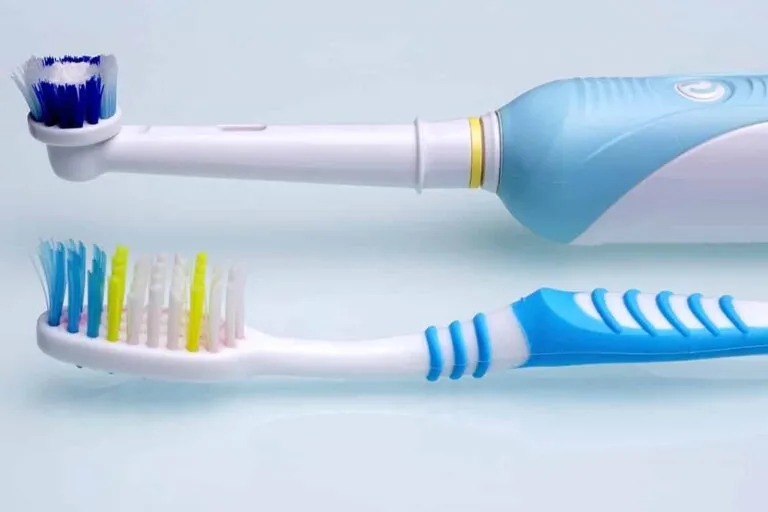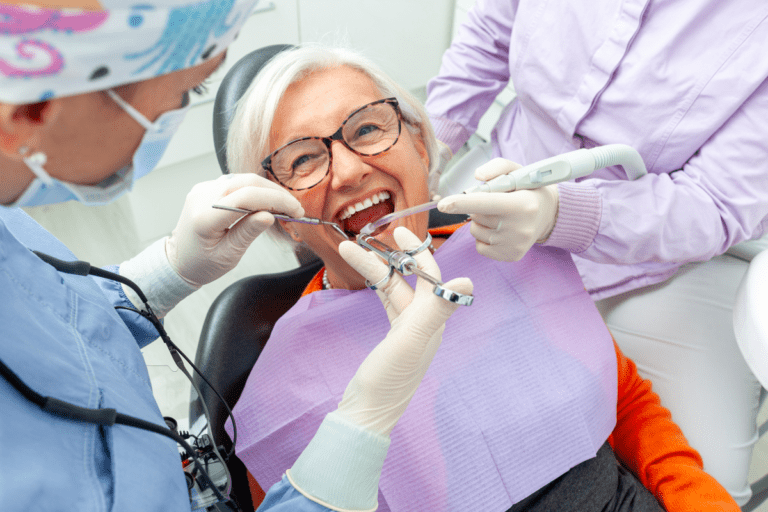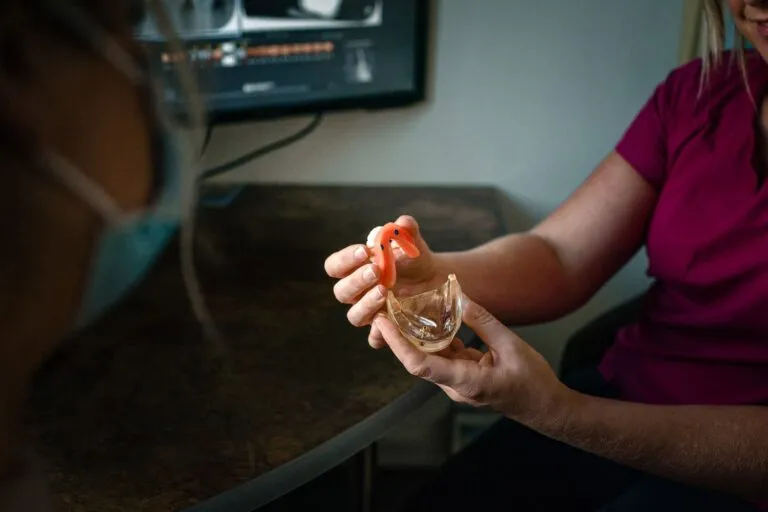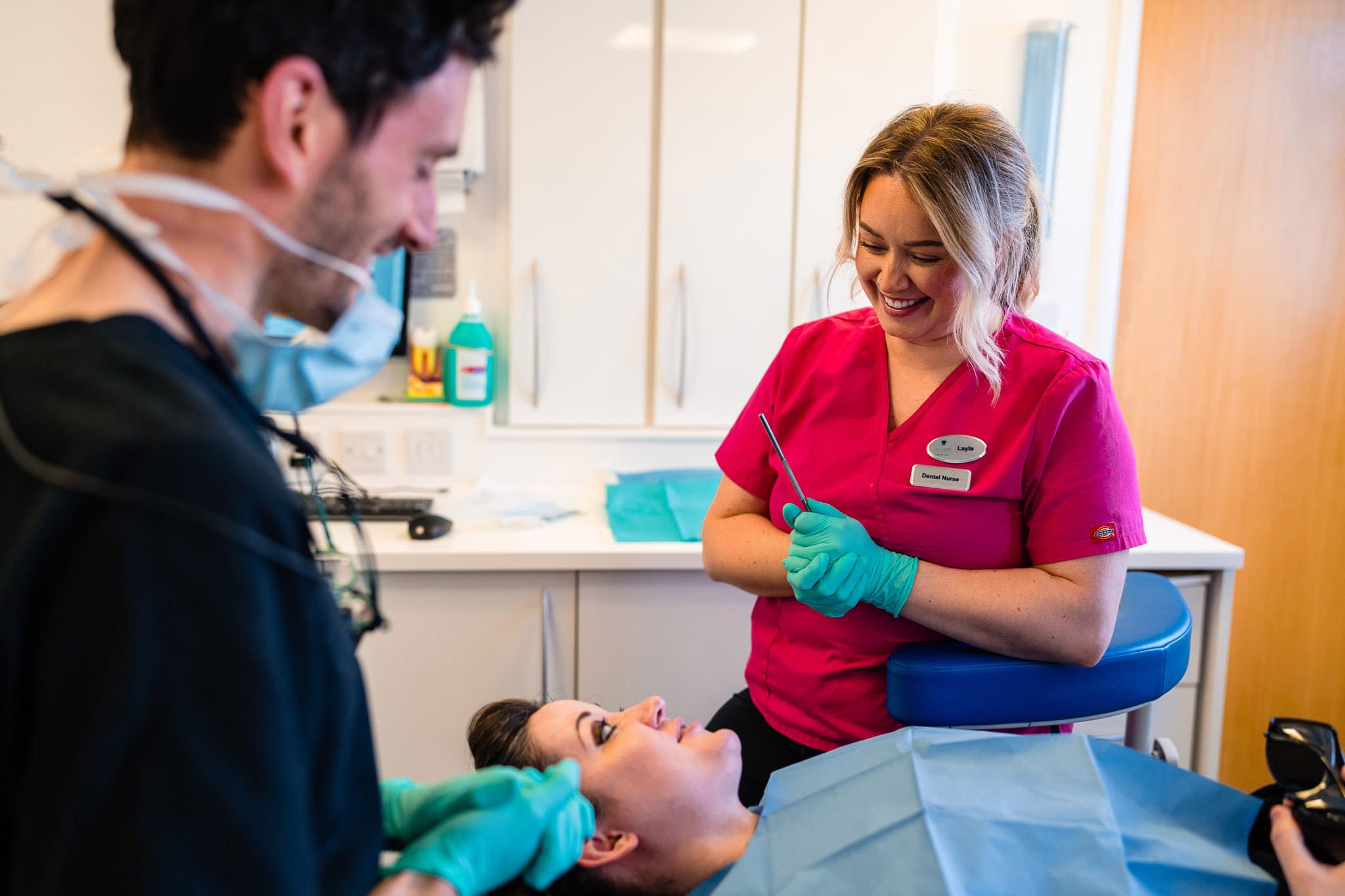Understanding the different types of dental implants available is the first step towards restoring your smile and confidence. Whether you’re missing a single tooth or require a full-arch restoration, modern implant dentistry offers customised solutions to meet your unique needs.
At Pure Dental, we’re here to guide you through your options – from traditional endosteal implants to innovative techniques like All-on-4 and zygomatic implants. Here, we explore which type of dental implant could help you achieve the healthy, natural-looking smile you deserve.
What Are the Main Types of Dental Implants?
Dental implants are categorised into three main types based on their placement method and location in the jaw. Each type of dental implant is designed to suit different bone structures and patient needs, ensuring that everyone can benefit from permanent tooth replacement, regardless of their individual circumstances.
The three different types of dental implants are:
- Endosteal implants – The most of the most common types of dental implant, placed directly into the jawbone and suitable for patients with sufficient bone density
- Subperiosteal implants – Positioned on top of the jawbone beneath the gum tissue, ideal for patients who lack adequate bone height
- Zygomatic implants – Anchored in the cheekbone (zygoma) rather than the jawbone, offering a solution when severe bone loss is present in the upper jaw
Different Types of Dental Implants at a Glance
| Type | Placement | Number of Implants | Best Suited For | Bone Requirements | Treatment Time | Relative Cost |
| Endosteal | Into the jawbone | 1 per tooth | Single or multiple missing teeth | Good bone density required | 3-6 months | £ – ££ per tooth |
| Subperiosteal | On top of jawbone, under gum | Varies (framework design) | Patients with insufficient bone height | Minimal bone required | 2-3 months | ££ – £££ |
| Zygomatic | Into cheekbone | 2-4 per arch | Severe upper jaw bone loss | No upper jaw bone needed | 1 day – 3 months | £££££ |
| All-on-4 | Into jawbone (angled) | 4 per arch | Full arch replacement | Moderate bone density | Often same day | £££ – ££££ per arch |
| All-on-6 | Into jawbone (angled) | 6 per arch | Full arch with enhanced stability | Good bone density | Often same day | ££££ per arch |
| Full Mouth | Into jawbone | 6-8 per arch | Complete mouth restoration | Excellent bone density | 3-6 months | £££££ (both arches) |
At Pure Dental, we’ll provide you with a detailed treatment plan and transparent pricing during your consultation, ensuring you understand exactly what each different type of dental implant solution involves. Every smile is unique, and we’re here to help you find the perfect option for your needs and budget.
Let’s take a look at the different types of dental implants in more detail so you can better understand what might be involved with each:
Endosteal Implants (Most Common)
Endosteal implants are the gold standard of tooth replacement and the most frequently used type of dental implant worldwide. These small titanium posts are surgically placed directly into your jawbone, where they fuse with the bone through a natural process called osseointegration. Once fully integrated, a custom-made crown is attached to create a restoration that looks, feels and functions just like a natural tooth.
Who they’re best for: Endosteal implants are ideal for patients who have good jawbone density and healthy gums. They’re suitable for replacing single teeth, multiple teeth, or can be used to support bridges and dentures. Most patients are excellent candidates for this type of implant.
Benefits: These implants offer exceptional stability and longevity, often lasting a lifetime with proper care. They help preserve your jawbone by stimulating natural bone growth, prevent neighbouring teeth from shifting, and restore full chewing function. With success rates exceeding 95%, endosteal implants are a predictable and reliable solution that closely mimics your natural tooth structure.
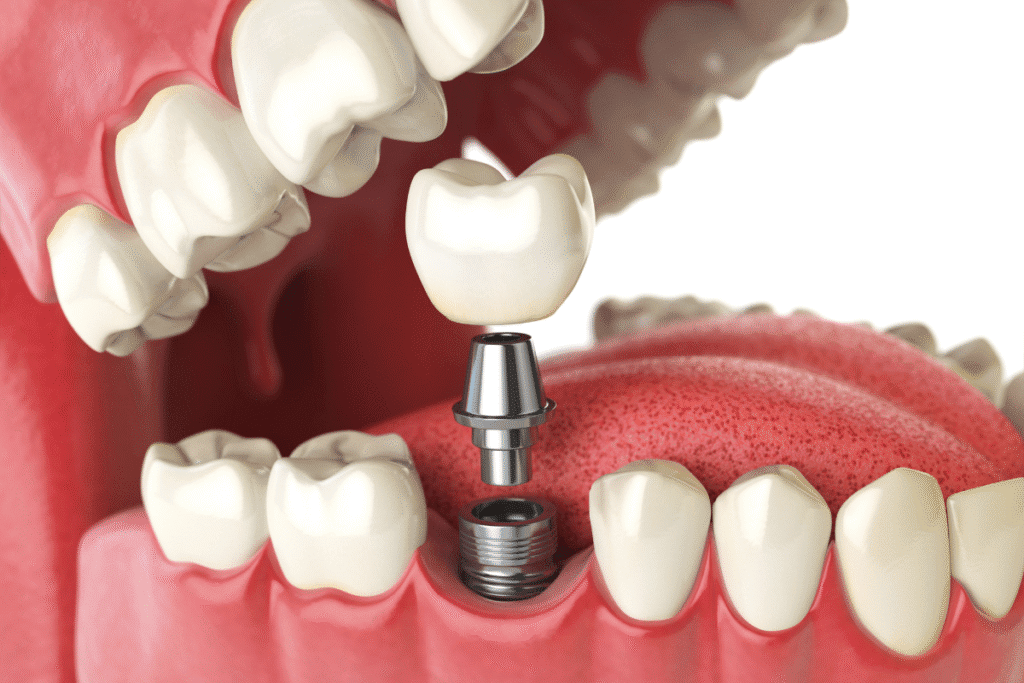
Subperiosteal Implants
Subperiosteal implants provide an alternative approach for patients who lack sufficient jawbone height or density for traditional endosteal implants. Rather than being inserted into the bone, these implants consist of a metal framework that sits on top of the jawbone, just beneath the gum tissue. The framework features posts that protrude through the gums to hold the replacement teeth securely in place.
When they’re recommended: Your dentist may suggest subperiosteal implants if you’ve experienced significant bone loss and either cannot or prefer not to undergo bone grafting procedures. They’re particularly useful for patients seeking a less invasive alternative to bone augmentation surgery, though they’re less commonly used today due to advances in bone grafting techniques.
Benefits: Subperiosteal implants require a shorter healing time compared to endosteal implants and eliminate the need for extensive bone grafting procedures. They offer a more stable solution than removable dentures, restoring your ability to eat and speak with confidence. While they may not offer the same longevity as endosteal implants, they remain a viable option for specific clinical situations.
Zygomatic Implants
Zygomatic implants represent an advanced implant solution designed for complex cases involving severe bone loss in the upper jaw. Unlike conventional implants that anchor into the jawbone, zygomatic implants are much longer and are secured into the zygomatic bone (cheekbone), which typically remains dense and strong even when significant jawbone deterioration has occurred. This innovative technique was specifically developed to help patients who were previously told they weren’t suitable candidates for dental implants.
Who needs them: Zygomatic implants are recommended for patients with severe upper jaw bone loss who would otherwise require extensive bone grafting procedures. They’re particularly beneficial if you’ve worn dentures for many years, experienced bone resorption due to gum disease, or have had unsuccessful implant treatments in the past. This specialist dental implant procedure offers hope when traditional implant options aren’t viable.
Complex cases: This advanced technique requires a highly skilled and experienced implant surgeon, as the procedure is more complex than standard implant placement. At Pure Dental, we carefully assess each patient’s unique situation to determine whether zygomatic implants are the right solution. The benefit is that they often eliminate the need for lengthy bone grafting procedures, allowing for faster treatment and, in some cases, the possibility of same-day teeth.
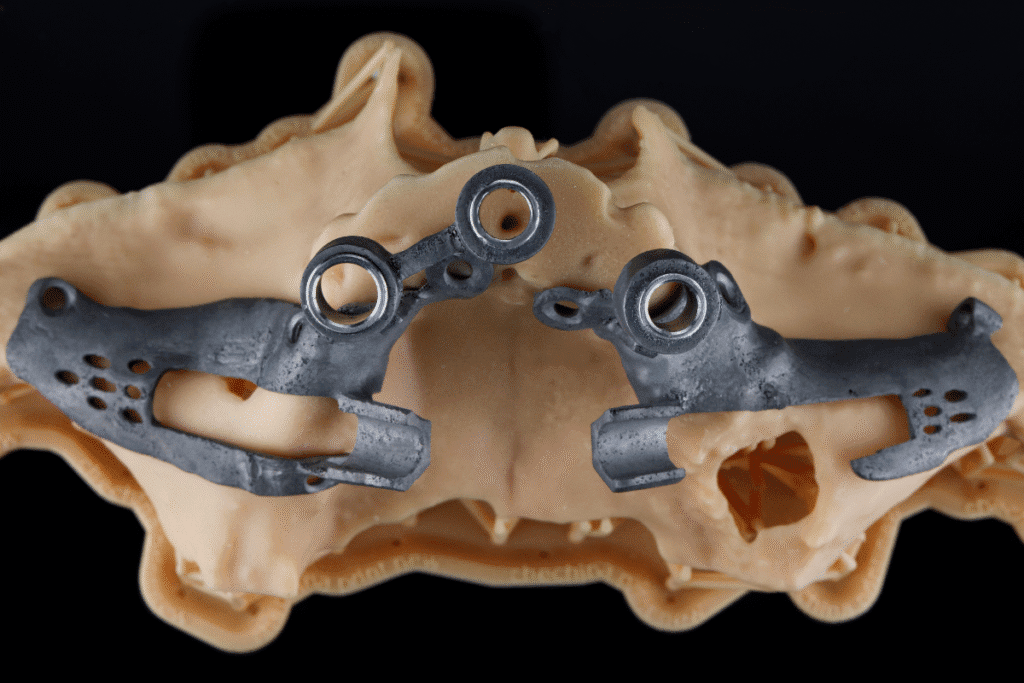
Full Arch Implant Solutions
When you’re missing most or all of your teeth in either jaw, full arch implant solutions offer a transformative way to restore your entire smile with just a few strategically placed implants. These innovative techniques provide stable, permanent alternatives to traditional dentures, allowing you to enjoy life without the worry of slipping plates or dietary restrictions.
All-on-4 Dental Implants
All-on-4 dental implants are a revolutionary treatment that allows a full arch of replacement teeth to be supported by just four strategically positioned implants. This technique involves placing two implants vertically at the front of your jaw, where bone density is typically better, and two at an angle towards the back. A fixed bridge containing all your replacement teeth is then securely attached to these four implants, often on the same day as your surgery.
Benefits: The All-on-4 system offers remarkable advantages, including the possibility of leaving the clinic with a new full set of teeth in just one day. By using only four implants, the procedure is less invasive and more cost-effective than placing individual implants for each tooth. The angled placement of the back implants often eliminates the need for bone grafting, even in patients with moderate to severe bone loss. You’ll enjoy restored chewing function, improved speech, and a natural-looking smile that stays firmly in place.
Who they suit: All-on-4 implants are ideal for patients who are missing all or most of their teeth in one or both arches, particularly those who want to avoid removable dentures. They’re suitable if you have moderate bone density and are looking for a fixed, permanent solution that offers excellent value. Many patients who have struggled with loose dentures find All-on-4 life-changing, as it restores confidence and allows them to eat their favourite foods again.
All-on-6 Dental Implants
All-on-6 dental implants work on the same principle as All-on-4, but use six implants instead of four to support your full arch of replacement teeth. The additional two implants are typically placed in the middle section of your jaw, creating a broader base of support for your new teeth. This enhanced foundation distributes biting forces more evenly across all six implants.
Difference from All-on-4: The key distinction lies in the added stability and support that comes from having six anchor points rather than four. While All-on-4 is an excellent solution for many patients, All-on-6 may be recommended if you have better bone quality that can accommodate additional implants, or if you have a stronger bite force.
Added stability: With six implants supporting your new teeth, you’ll benefit from enhanced stability and an even more secure feel when eating and speaking. The additional support can be particularly advantageous for patients who grind their teeth or have a particularly strong bite. While the treatment involves two extra implants, many patients find the increased confidence and durability well worth it. Your dentist at Pure Dental will assess your individual needs to determine whether All-on-4 or All-on-6 is the best option for you.
Full Mouth Dental Implants
Full mouth dental implants represent the most comprehensive approach to complete tooth replacement, involving the placement of individual implants throughout both your upper and lower jaws. Unlike All-on-4 or All-on-6 solutions, where a fixed bridge is attached to a limited number of implants, full mouth restoration typically uses 6-8 implants per arch, with each implant or pair of implants supporting individual crowns or small bridges.
This approach provides the ultimate in stability, function and aesthetics, most closely replicating your natural teeth. Each tooth can be individually crafted and positioned for optimal appearance and bite alignment. Full mouth dental implants offer unparalleled chewing efficiency and allow your dentist to create a completely customised smile that’s tailored to your facial structure and preferences.
Who this suits: Full mouth dental implants are ideal for patients who want the highest level of restoration and have sufficient bone density to support multiple implants. While this is the most comprehensive and investment-intensive option, it delivers exceptional long-term results.
Here at Pure Dental, we’ll discuss all your options in depth so you can make the decision that’s right for your lifestyle, budget and dental goals.
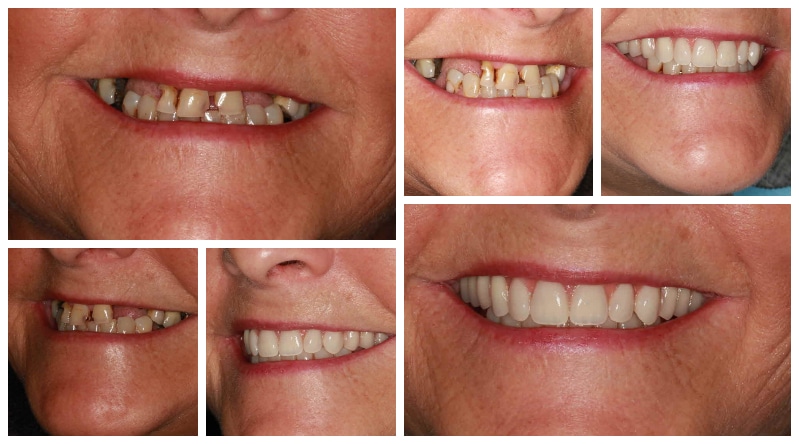
Specialised Dental Implant Options
Beyond the main different types of dental implants, there are several specialised options designed to address specific dental needs and circumstances.
These tailored solutions ensure that whether you’re missing just one tooth or require a faster treatment timeline, there’s an implant option that’s perfectly suited to your situation.
Single Tooth Implants
A single tooth implant is the ideal solution when you’ve lost just one tooth and want to replace it without affecting the neighbouring healthy teeth. This treatment involves placing one endosteal implant into the jawbone at the site of your missing tooth, allowing it to integrate with the bone over several months. It is then attached to a custom-made crown that matches your natural teeth perfectly.
Unlike traditional bridges that require grinding down adjacent teeth for support, single tooth implants are entirely self-supporting. This means your healthy teeth remain untouched and preserved. The implant acts just like a natural tooth root, stimulating your jawbone to prevent bone loss that typically occurs after tooth loss. The result is a seamless restoration that looks, feels and functions exactly like your original tooth.
Who they’re ideal for: Single tooth implants are perfect for patients who have lost one tooth due to injury, decay or gum disease, and have sufficient bone density in that area. They’re particularly popular among younger patients who want to preserve their remaining teeth and invest in a long-term solution. At Pure Dental, we frequently recommend single-tooth implants as they offer the most conservative and predictable way to fill a gap in your smile, while protecting your oral health for years to come.
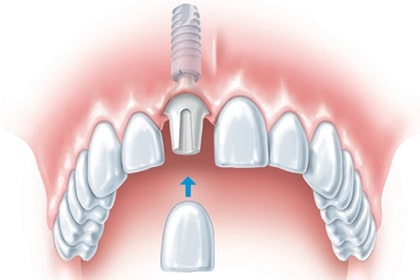
Mini Dental Implants
Mini dental implants (MDIs) are smaller-diameter implants, typically less than 3mm wide compared to standard implants, which are 3.5-6mm in diameter. These narrow-diameter implants consist of a single piece with a ball-shaped end that protrudes through the gum, onto which a denture or crown can be attached to the implant. Their compact size makes them suitable for situations where space is limited or bone width is reduced.
Benefits and uses: The smaller size of mini implants means the placement procedure is less invasive, often requiring no incisions or stitches. They’re frequently used to stabilise loose lower dentures, providing much-needed security without extensive surgery. Many patients appreciate that mini implants can often be placed and loaded with teeth on the same day, and the recovery time is typically faster than conventional implants.
Considerations: Whilst mini dental implants offer advantages in specific situations, they don’t provide the same level of strength and longevity as standard-sized implants. They’re best suited for stabilising dentures or replacing small teeth like lower incisors, rather than for back teeth that endure heavy chewing forces.
Immediate Load Implants (Same-Day Teeth)
Immediate load implants, often referred to as “same-day teeth” or “teeth in a day,” enable you to leave the dental practice with functional temporary teeth attached to your new implants on the same day as your surgery. Rather than waiting several months for the implants to integrate with your bone before placing teeth, this accelerated protocol enables you to walk out with a restored smile immediately.
How it works: This technique requires careful planning and assessment to ensure you have sufficient bone quality and quantity to support immediate loading. Your dentist will place the implants strategically, often at angles to maximise contact with available bone, and then attach a temporary bridge or denture that’s designed to limit pressure on the implants during the crucial healing phase. After several months of integration, these temporary teeth are replaced with your final, permanent restoration.
Who benefits most: Immediate load implants are particularly life-changing for patients who don’t want to go without teeth during the healing period, whether for professional, social or personal reasons. They’re commonly used with All-on-4 or All-on-6 treatments but can also be applied in other suitable cases. The psychological benefit of not having to wear a removable denture or go without teeth during healing is significant for many patients.
Important considerations: Not everyone is a candidate for immediate loading – it depends on your bone quality, oral health, and bite characteristics. At Pure Dental, we conduct thorough assessments to determine if same-day teeth are viable for you. While the immediate result is wonderful, it’s essential to follow all post-operative care instructions carefully, as the implants still need time to fully integrate with your bone for long-term success.
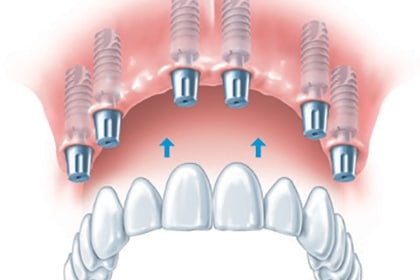
Implant Materials: What Are Dental Implants Made Of?
The material your dental implant is made from plays a crucial role in its success and longevity. Today’s implants are crafted from biocompatible materials that integrate safely with your body, with two main options available depending on your specific needs and preferences.
- Titanium Dental Implants
Titanium implants are the most widely used and extensively researched option, with over 50 years of proven clinical success. This lightweight, strong metal is biocompatible, meaning your body accepts it naturally without rejection. Titanium has the unique ability to fuse directly with your jawbone through osseointegration, creating an incredibly strong and stable foundation. These implants boast success rates exceeding 95% and are suitable for virtually all patients, making them the gold standard in implant dentistry. - Zirconia (Ceramic) Dental Implants
Zirconia implants are a newer, metal-free alternative made from a white ceramic material. They’re particularly appealing to patients who prefer a holistic approach, have metal sensitivities, or are concerned about the aesthetic appearance of the implant abutment showing through thin gums. Zirconia is also biocompatible and integrates well with bone, though it has a shorter track record than titanium. These one-piece implants are naturally tooth-coloured and hypoallergenic, offering an excellent option for front teeth where aesthetics are paramount.
Supporting Procedures for Dental Implants
Sometimes, additional procedures are needed to prepare your jaw for successful dental implant placement. These supporting treatments help create the ideal foundation for your implants, ensuring long-term stability and success even when bone loss has occurred.
Bone Grafting
Bone grafting is a common procedure that rebuilds or augments your jawbone when there is insufficient bone volume to support an implant. This can happen due to gum disease, tooth loss, injury, or simply the natural bone resorption that occurs over time.
During the procedure, bone grafting material (which can be from your own body, a donor source, or synthetic) is placed in the areas where bone is lacking. Over several months, this graft integrates with your existing bone, creating a solid foundation strong enough to hold an implant securely. Whilst bone grafting does extend your overall treatment time by 3-6 months, it significantly improves your chances of implant success. It opens up treatment possibilities for patients who might otherwise be told implants aren’t an option.
Sinus Lift
A sinus lift, also called sinus augmentation, is specifically used when placing implants in the upper back jaw where the sinuses sit very close to the jawbone. If you’ve lost teeth in this area, the bone often becomes too thin because it’s been resorbed from below whilst the sinus cavity expands from above.
During a sinus lift, your dentist gently lifts the sinus membrane upward and places bone graft material into the space created below it. This increases the height of the bone, providing adequate depth for implant placement. The procedure sounds more daunting than it is – it’s a routine technique that’s performed regularly at Pure Dental. After healing (typically 4-6 months), your jaw will have sufficient bone to support implants in the upper back teeth area, restoring your ability to chew.
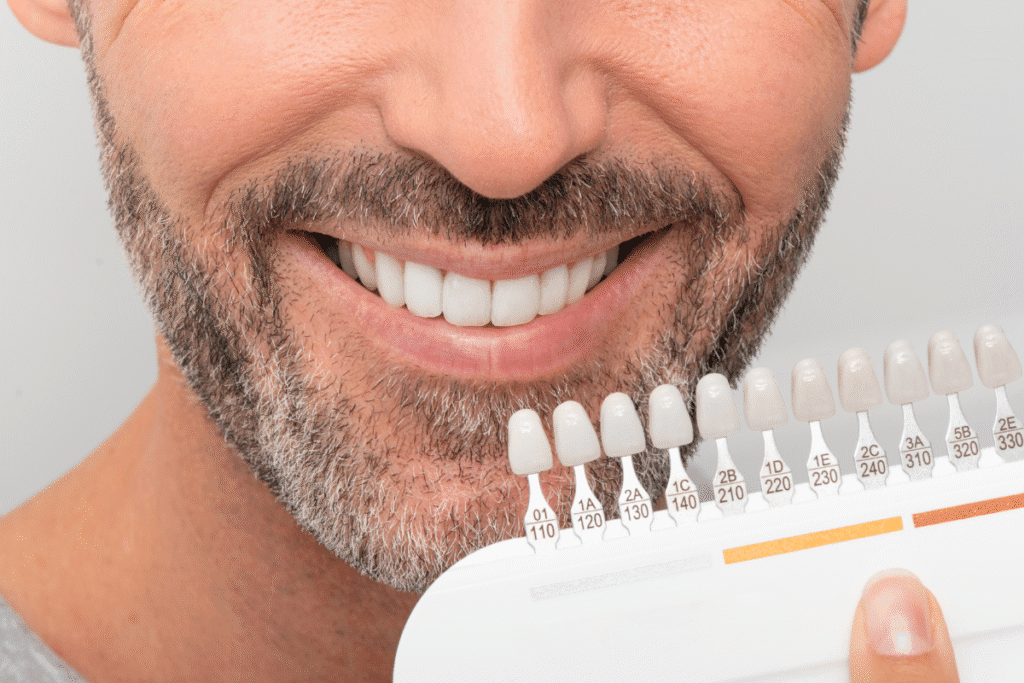
How to Choose the Right Type of Dental Implant
Choosing the right type of dental implant is vital for satisfaction and success. During your consultation at Pure Dental, we’ll conduct a thorough examination, take detailed scans of your jaw, and discuss your goals to recommend the most suitable option for your unique situation. There’s no one-size-fits-all solution – the best choice is the one that meets your individual needs whilst delivering lasting results you can smile about.
What to Expect During the Dental Implant Process
Understanding what happens at each stage of your implant journey helps you feel prepared and confident about your treatment. Whilst every patient’s experience is slightly different, the dental implant process typically follows a clear pathway from initial consultation through to your final restoration.
- Initial Consultation Your journey begins with a comprehensive consultation where we’ll examine your teeth and gums, take X-rays or 3D scans, and discuss your medical history. This appointment is your opportunity to ask questions, explore your options, and understand the treatment process fully. We’ll create a personalised treatment plan tailored to your needs and provide transparent information about costs and timescales, ensuring you have everything you need to make an informed decision.
- The Implant Procedure The implant placement itself is typically performed under local anaesthetic, so you won’t feel any pain during the procedure. Your dentist will carefully position the implant into your jawbone following the precise treatment plan, and the entire process usually takes 1-2 hours, depending on how many implants are being placed. Many patients are surprised at how straightforward and comfortable the experience is, and you’ll be able to return home the same day with detailed aftercare instructions.
- Healing and Recovery After placement, your implants need time to fuse with your jawbone. This typically takes 3-6 months, though you’ll usually feel back to normal within a week or two. During this healing period, you may require temporary teeth, and we’ll monitor your progress with follow-up appointments. Once fully healed, your permanent crowns, bridges or dentures are attached, completing your transformation and giving you a smile that’s built to last.
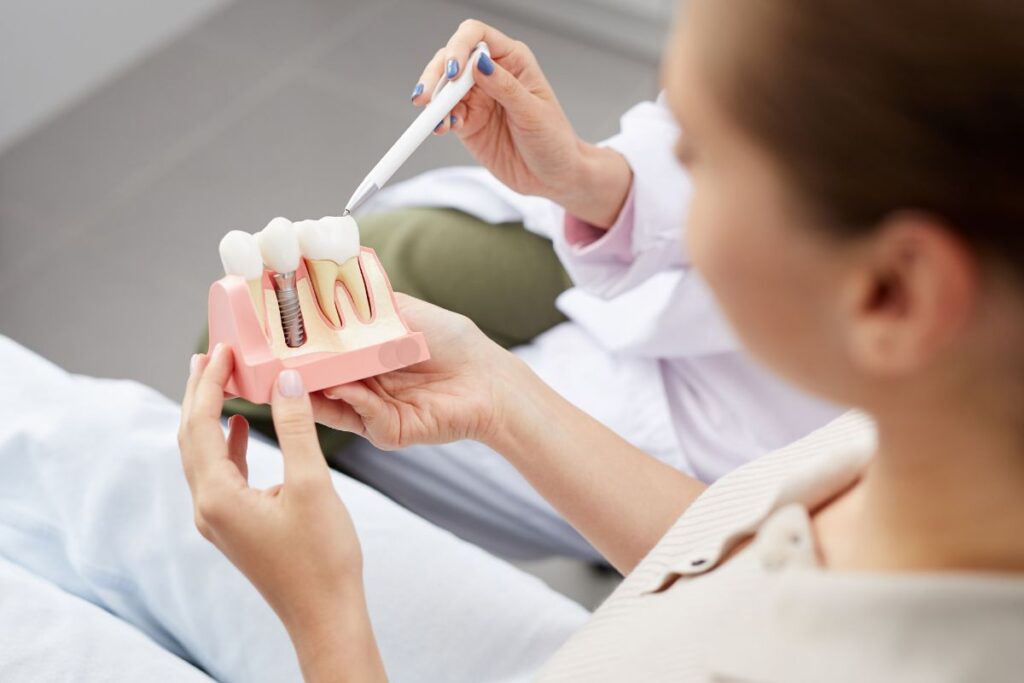
Dental Implants vs Other Tooth Replacement Options
When you’re missing teeth, it’s important to understand all your options. Whilst dentures and bridges have their place, dental implants offer distinct advantages that make them the preferred choice for many patients seeking a long-term solution.
Dental Implants vs Dentures
Unlike removable dentures that sit on your gums and can slip or click, dental implants are permanently fixed in place and function just like natural teeth. Implants don’t require messy adhesives, allow you to eat all your favourite foods without worry, and prevent the bone loss that typically occurs with dentures. Whilst dentures need replacing every 5-10 years, properly maintained implants can last a lifetime, often making them more cost-effective in the long run despite the higher initial investment.
Dental Implants vs Bridges
Traditional bridges require grinding down healthy adjacent teeth to use them as anchors, whereas implants are self-supporting and preserve your natural tooth structure. Bridges typically last 10-15 years before needing replacement. Dental implants also prevent bone loss at the site of the missing tooth, maintaining your facial structure and preventing the sunken appearance that can develop with bridges over time.
Why Choose Dental Implants?
Dental implants are the only tooth replacement option that replaces both the visible tooth and the root, preserving your jawbone and maintaining your facial structure. They offer unmatched stability, comfort and confidence – you can eat, speak and smile naturally without worrying about movement or discomfort. With proper care, implants provide a permanent solution that protects your oral health, prevents further tooth loss, and delivers exceptional aesthetic results that look and feel completely natural.
Are You a Good Candidate for Dental Implants?
Most people who are missing one or more teeth are suitable candidates for dental implants, provided they have good general health and adequate bone density.
Even if you’ve been told in the past that you don’t have enough bone, modern techniques like bone grafting and zygomatic implants mean more patients than ever can benefit from implant treatment.
The Benefits of Dental Implants
Dental implants offer life-changing benefits that go far beyond simply filling gaps in your smile.
Implants prevent bone loss and facial sagging by stimulating your jawbone just like natural tooth roots, helping you maintain a youthful appearance. Unlike dentures or bridges, they’re permanent, comfortable and require no special maintenance – just brush and floss as you would your natural teeth. Most importantly, implants restore confidence, enabling you to smile, laugh and live your life without worrying about your teeth.
Conclusion
Understanding the different types of dental implants available is the first step towards reclaiming your smile and confidence. Modern implant dentistry offers tailored options to suit virtually every situation.
At Pure Dental in Truro, our experienced implant team is here to guide you through every step of your journey, from initial consultation through to your final, beautiful result.
We understand that choosing dental implants is an important decision, and we’re committed to providing you with all the information, support and expert care you need to make the choice that’s right for you.
Ready to explore which type of dental implant could transform your smile?
Book your consultation at Pure Dental today and discover how we can help you achieve the confident, healthy smile you deserve. Your journey to permanent, natural-looking teeth starts here.
Book Your Dental Implant Consultation in Truro or call our friendly team on 01872 222 404 to discuss your options. We’re here to help you smile with confidence again.
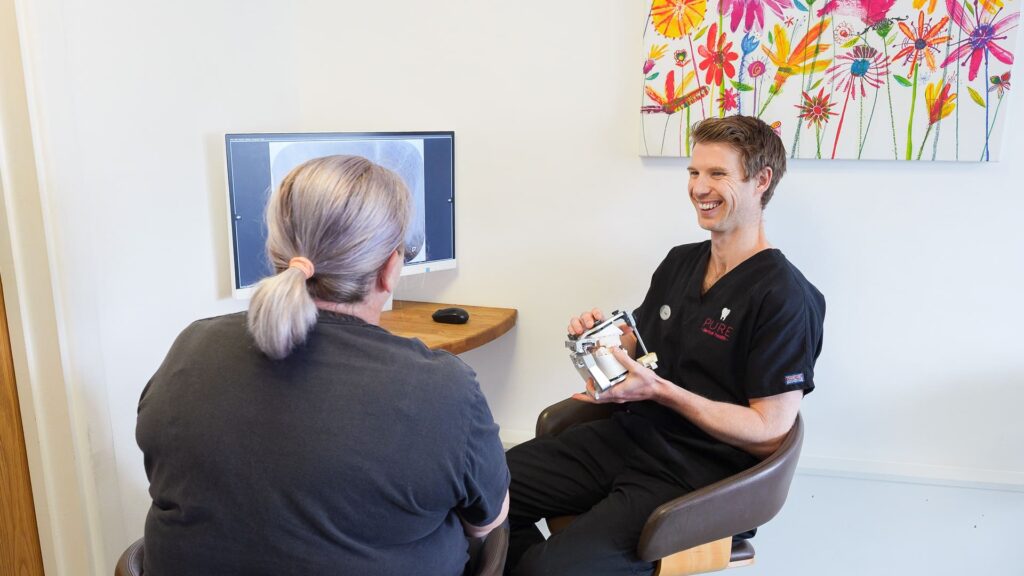
Frequently Asked Questions About Different Types of Dental Implants
How long do dental implants last?
With proper care and maintenance, dental implants can last a lifetime – the titanium post typically never needs replacing, whilst the crown may need replacement after 10-15 years due to normal wear.
Are dental implants painful?
The procedure itself is performed under local anaesthetic, so you won’t feel pain during treatment, and most patients report that any discomfort afterwards is manageable with over-the-counter painkillers and settles within a few days.
How much do dental implants cost?
The cost of dental implants varies depending on the type and number needed, ranging from around £3,000 for a single tooth implant to £20,000+ for full mouth restoration. We’ll provide transparent pricing during your consultation at Pure Dental.
Can I get dental implants if I have gum disease?
You’ll need to have any active gum disease treated and under control before implant placement, but once your gums are healthy, implants are usually a viable option.
What is the success rate of dental implants?
Dental implants have an excellent success rate of over 95%, making them one of the most predictable and reliable treatments in modern dentistry when placed by experienced practitioners.
What are the three main types of dental implants?
The three main types are endosteal implants (placed into the jawbone), subperiosteal implants (positioned on top of the bone), and zygomatic implants (anchored in the cheekbone).
Which are the best dental implants?
Endosteal implants are considered the gold standard due to their proven track record and exceptional success rates, though the “best” option depends entirely on your individual bone structure, dental needs and circumstances.
What does no one tell you about dental implants?
Many patients are surprised by how natural implants feel – after the initial healing period, most people completely forget which teeth are implants because they function and feel exactly like their own teeth.
Which type of teeth implant is best?
The best type of implant for you depends on factors such as the number of teeth you’re missing, your bone density, budget, and treatment goals – there’s no single “best” option, only the one that’s right for your unique situation.
